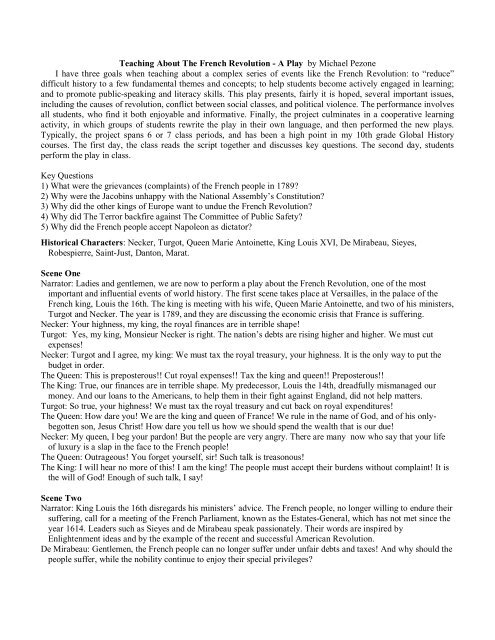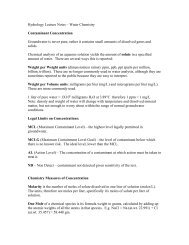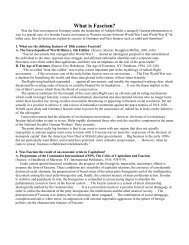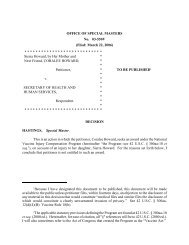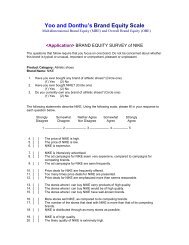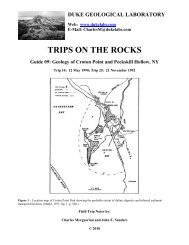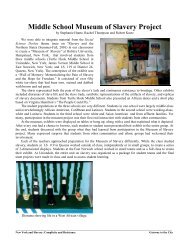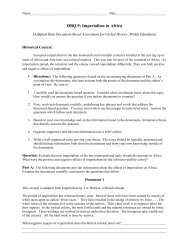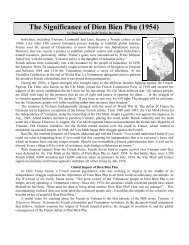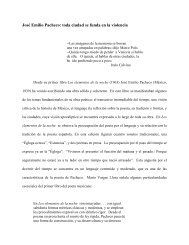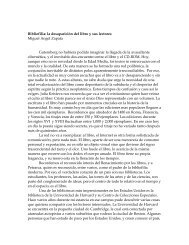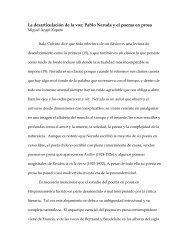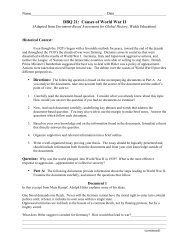Teaching About The French Revolution - A Play by ... - Hofstra People
Teaching About The French Revolution - A Play by ... - Hofstra People
Teaching About The French Revolution - A Play by ... - Hofstra People
Create successful ePaper yourself
Turn your PDF publications into a flip-book with our unique Google optimized e-Paper software.
<strong>Teaching</strong> <strong>About</strong> <strong>The</strong> <strong>French</strong> <strong>Revolution</strong> - A <strong>Play</strong> <strong>by</strong> Michael Pezone<br />
I have three goals when teaching about a complex series of events like the <strong>French</strong> <strong>Revolution</strong>: to “reduce”<br />
difficult history to a few fundamental themes and concepts; to help students become actively engaged in learning;<br />
and to promote public-speaking and literacy skills. This play presents, fairly it is hoped, several important issues,<br />
including the causes of revolution, conflict between social classes, and political violence. <strong>The</strong> performance involves<br />
all students, who find it both enjoyable and informative. Finally, the project culminates in a cooperative learning<br />
activity, in which groups of students rewrite the play in their own language, and then performed the new plays.<br />
Typically, the project spans 6 or 7 class periods, and has been a high point in my 10th grade Global History<br />
courses. <strong>The</strong> first day, the class reads the script together and discusses key questions. <strong>The</strong> second day, students<br />
perform the play in class.<br />
Key Questions<br />
1) What were the grievances (complaints) of the <strong>French</strong> people in 1789?<br />
2) Why were the Jacobins unhappy with the National Assembly’s Constitution?<br />
3) Why did the other kings of Europe want to undue the <strong>French</strong> <strong>Revolution</strong>?<br />
4) Why did <strong>The</strong> Terror backfire against <strong>The</strong> Committee of Public Safety?<br />
5) Why did the <strong>French</strong> people accept Napoleon as dictator?<br />
Historical Characters: Necker, Turgot, Queen Marie Antoinette, King Louis XVI, De Mirabeau, Sieyes,<br />
Robespierre, Saint-Just, Danton, Marat.<br />
Scene One<br />
Narrator: Ladies and gentlemen, we are now to perform a play about the <strong>French</strong> <strong>Revolution</strong>, one of the most<br />
important and influential events of world history. <strong>The</strong> first scene takes place at Versailles, in the palace of the<br />
<strong>French</strong> king, Louis the 16th. <strong>The</strong> king is meeting with his wife, Queen Marie Antoinette, and two of his ministers,<br />
Turgot and Necker. <strong>The</strong> year is 1789, and they are discussing the economic crisis that France is suffering.<br />
Necker: Your highness, my king, the royal finances are in terrible shape!<br />
Turgot: Yes, my king, Monsieur Necker is right. <strong>The</strong> nation’s debts are rising higher and higher. We must cut<br />
expenses!<br />
Necker: Turgot and I agree, my king: We must tax the royal treasury, your highness. It is the only way to put the<br />
budget in order.<br />
<strong>The</strong> Queen: This is preposterous!! Cut royal expenses!! Tax the king and queen!! Preposterous!!<br />
<strong>The</strong> King: True, our finances are in terrible shape. My predecessor, Louis the 14th, dreadfully mismanaged our<br />
money. And our loans to the Americans, to help them in their fight against England, did not help matters.<br />
Turgot: So true, your highness! We must tax the royal treasury and cut back on royal expenditures!<br />
<strong>The</strong> Queen: How dare you! We are the king and queen of France! We rule in the name of God, and of his onlybegotten<br />
son, Jesus Christ! How dare you tell us how we should spend the wealth that is our due!<br />
Necker: My queen, I beg your pardon! But the people are very angry. <strong>The</strong>re are many now who say that your life<br />
of luxury is a slap in the face to the <strong>French</strong> people!<br />
<strong>The</strong> Queen: Outrageous! You forget yourself, sir! Such talk is treasonous!<br />
<strong>The</strong> King: I will hear no more of this! I am the king! <strong>The</strong> people must accept their burdens without complaint! It is<br />
the will of God! Enough of such talk, I say!<br />
Scene Two<br />
Narrator: King Louis the 16th disregards his ministers’ advice. <strong>The</strong> <strong>French</strong> people, no longer willing to endure their<br />
suffering, call for a meeting of the <strong>French</strong> Parliament, known as the Estates-General, which has not met since the<br />
year 1614. Leaders such as Sieyes and de Mirabeau speak passionately. <strong>The</strong>ir words are inspired <strong>by</strong><br />
Enlightenment ideas and <strong>by</strong> the example of the recent and successful American <strong>Revolution</strong>.<br />
De Mirabeau: Gentlemen, the <strong>French</strong> people can no longer suffer under unfair debts and taxes! And why should the<br />
people suffer, while the nobility continue to enjoy their special privileges?
Sieyes: Yes, good de Mirabeau! And the government continues to interfere with our businesses! Let us not forget<br />
the words of our great philosopher, Rousseau: “Man is born free, but everywhere he is in chains!”<br />
De Mirabeau: Yes, nor let us not forget the great achievement of our brothers in America, who resisted tyranny and<br />
sent King George packing!<br />
Sieyes: Indeed! Where would they have been without our support? If we can help the Americans gain their<br />
freedom, we can help ourselves to the same!<br />
De Mirabeau: We must form a National Assembly, where the voice of the people can be heard!<br />
Sieyes: Yes, and we must write a Constitution!<br />
<strong>The</strong> <strong>People</strong>: Yes!!! A National Assembly!! A Constitution!!<br />
Scene Three<br />
Narrator: A National Assembly is formed and soon issues a famous document called the Declaration of the Rights<br />
of Man. In response, the King sends loyal soldiers into the city of Paris. <strong>The</strong> people, in anger, storm a fortress<br />
called the Bastille (every year, <strong>French</strong> people celebrate Bastille day as the first act of the <strong>French</strong> <strong>Revolution</strong>).<br />
Thousands of people march in protest to the palace at Versailles. <strong>The</strong> <strong>French</strong> <strong>Revolution</strong> has begun.<br />
<strong>The</strong> <strong>People</strong>: Liberty!! Equality!! Fraternity!! Liberty!! Equality!! Fraternity!!<br />
Scene Four<br />
Narrator: By 1791, a new Constitution has been written, making France a limited monarchy. <strong>The</strong> King, and his<br />
royalist supports, are outraged <strong>by</strong> this limit on the King’s power. <strong>The</strong>y begin plotting to restore the King’s full<br />
powers. <strong>The</strong> Constitution also creates a new legislature, but restricts the right to vote to middle and upper class<br />
men who own property. This angers some radical leaders called Jacobins, who want to extend democratic rights<br />
to everyone. Around the city of Paris, the Jacobins meet to discuss France’s future. Men such as Robespierre,<br />
Danton, Saint-Just, and Marat lead them.<br />
Robespierre: Citizens! <strong>The</strong> king and queen are plotting against our revolution! We must be on our guard!<br />
Saint-Just: Robespierre is right! <strong>The</strong>re are rumors that Antoinette is communicating with the King of Prussia and<br />
the King of the Holy Roman Empire, asking them to invade France and overturn our revolution!!!<br />
Danton: <strong>The</strong>se are dangerous times! What is our National Assembly doing to protect our revolution!?<br />
Marat: Good question, Danton! <strong>The</strong> Assembly members are nothing but a group of bourgeois and noble dogs! <strong>The</strong>y<br />
do not care at all about the rights of the common people!<br />
Saint-Just: Marat is right! See how they have denied the vote to all but men of property!<br />
Marat: Disgraceful!!<br />
Narrator: Just then, a messenger runs in with extremely important and troubling news!<br />
Messenger: Citizens! I have amazing news! <strong>The</strong> king and his family have been arrested as they were trying to flee<br />
France to join our enemies! And there is more! King Leopold and King Frederich Wilhelm have threatened to<br />
invade France and restore absolute monarchy!!<br />
Robespierre: It is counter-revolution!!<br />
Danton: Our enemies are ready to pounce on us!!<br />
Marat: <strong>The</strong> National Assembly will not protect the revolution!! We must abolish it!!<br />
Saint-Just: We must form a National Convention!! A new government that represents the common people!!<br />
Robespierre: We must write a new Constitution!! One that insures the rights of the people!!<br />
Danton: We must abolish the monarchy!!<br />
Marat: We must declare a republic!!<br />
Saint-Just: Yes! A republic!!<br />
Robespierre: <strong>The</strong> king cannot be allowed to organize his supporters! He must be put to death!<br />
Danton: We must declare war against our foreign enemies!!<br />
Marat: Louis to the guillotine!!<br />
<strong>The</strong> <strong>People</strong>: Death to the king!!! Long live the Republic!!!<br />
Narrator: <strong>The</strong> King and Queen of France are led to the guillotine, and beheaded!<br />
Scene Five
Narrator: It is 1792. <strong>The</strong> Jacobins form a National Convention, but real power is held <strong>by</strong> a group of 12 Jacobins on<br />
the Committee of Public Safety. Civil war soon breaks out between republicans and royalists. <strong>The</strong> new Republic<br />
of France creates a new calendar and the metric system of measurements, abolishes imprisonment for debt, and<br />
eliminates slavery in the <strong>French</strong> colonies. But at the same time, the Committee of Public Safety begins ordering<br />
the deaths of thousands of people whom it considers enemies of the Republic. This time of suspicion and mass<br />
murder is known as the Terror. <strong>The</strong> Terror increases in intensity after a noblewoman assassinates the popular<br />
leader, Marat. Soon the Committee’s leader, Robespierre, turns the violence upon Committee members<br />
themselves.<br />
Robespierre: Saint-Just, my friend, the way in which Danton was speaking was outrageous! He clearly wishes to<br />
compromise with our enemies!<br />
Saint-Just: Yes, Robespierre. He is calling for an end to the Terror! He might as well ask us to surrender to our<br />
enemies!<br />
Robespierre: He is a great danger to the <strong>Revolution</strong>! If he is allowed to divide the Committee, our enemies will<br />
surely take advantage!<br />
Saint-Just: He must be arrested!!<br />
Robespierre: He must be put to death!!<br />
Saint-Just: We have no choice!<br />
Robespierre: Yes, justice and virtue demand no less!!<br />
Narrator: Danton is led to the guillotine, and beheaded!<br />
Scene Six<br />
Narrator: By 1795, France is at war with the kingdoms of Europe. Soon, the <strong>French</strong> people turn against the<br />
Committee of Public Safety. Robespierre is arrested and guillotined! <strong>The</strong> next day, his friend Saint-Just is also<br />
beheaded! <strong>The</strong> National Convention creates a new Constitution, one even less democratic than the National<br />
Assembly’s Constitution. In response, a radical leader, Babeuf, tries to organize a democratic movement called<br />
the Conspiracy of Equals, but he too is arrested and killed! From 1795 to 1799, the people of France still suffer,<br />
as war against the royalist nations of Europe continues. By 1799, the <strong>French</strong> people long for a strong leader who<br />
will put an end to their suffering. A victorious general named Napoleon Bonaparte seizes power and becomes<br />
first consul of the Republic. In 1802, he is elected consul for life, and in 1804 he becomes Emperor of France. His<br />
armies win victory after victory until Napoleon controls most of Europe. But in 1812, Napoleon faces a new<br />
challenge:<br />
Napoleon: My people, let us pause a moment to consider the great benefits our victories have brought to Europe.<br />
We have abolished feudal privileges and eliminated serfdom. We have created a system of more equal taxation.<br />
We have given every man the right to vote. We have guaranteed freedom of religion. But perhaps our greatest<br />
achievement is the code of laws we have put in place throughout Europe. I am honored that some people refer to<br />
these laws as the Napoleonic Code. We have created equality under the law, and guaranteed habeus corpus, the<br />
right to a fair trial, and the right to be represented <strong>by</strong> counsel. What’s more, under our code, a person is innocent<br />
until proven guilty. But, my loyal subjects, our enemies are still trying to undo the great achievements of the<br />
revolution. Our one-time friend, Russia, has now declared war against us. But with your support, I shall lead our<br />
armies into Russia and on to victory! We must put an end, once and for all, to those who wish to restore the<br />
tyranny of kings! Long live the <strong>French</strong> Empire!<br />
Narrator: Napoleon leads his armies 500 miles into Russia, all the way to the city of Moscow. But all his army finds<br />
there is a burning city, set on fire <strong>by</strong> the Russians themselves so that its riches will not fall into <strong>French</strong> hands.<br />
Now Napoleon’s army, short of supplies, has to retreat hundreds of miles through a bitter Russian winter. A large<br />
part of Napoleon’s army dies from cold, starvation, and disease. As a result of this famous defeat, the European<br />
powers unite against Napoleon. In 1814, Napoleon is defeated and captured. In France, monarchy is restored, and<br />
Louis the 18th is made the new king. But despite this restoration of monarchy, the memory and example of the<br />
<strong>French</strong> <strong>Revolution</strong> and its cry of “liberty, equality, fraternity” lives on to inspire democrats and revolutionaries<br />
throughout the 19th and 20th centuries.<br />
<strong>The</strong> <strong>People</strong>: Liberty!! Equality!! Fraternity!! Liberty!! Equality!! Fraternity!!


